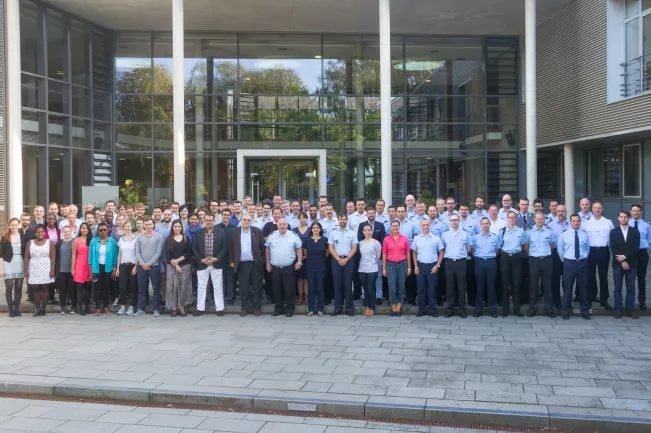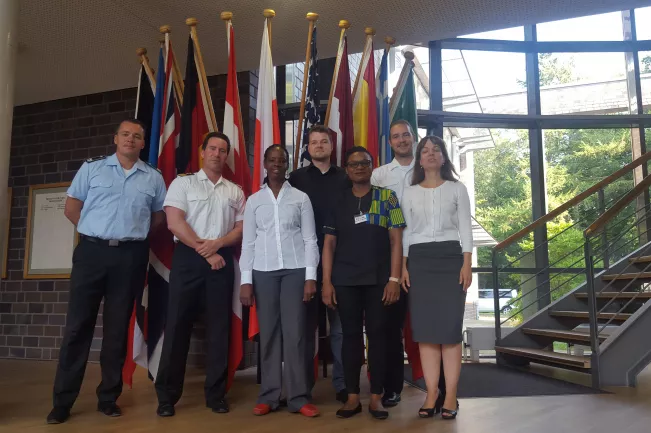Department of Management Sciences
UN–Peacekeeping Seminar 2016 in Hamburg

Originally, this unique training module is part of a two year general staff course of the German armed forces and focusses on the dynamics of civil-military cooperation – crucial in any UN-mission. But over the years it has grown into a multinational simulation of UN-missions that attracts participants from several countries and of various professional backgrounds, be it government, international organizations or NGOs.
The mornings of the first week started in the great lecture hall. There, everyone had the chance to listen to several UN and other international professionals, who shared their insights of years of experience. Such a “reality check” was very refreshing, highly interesting and sometimes disillusioning in regards to the theoretical knowledge presented in the course reader. Manfred Eisele and Julian Harston, both retired Assistant UN Secretary Generals, were just two of the various UN instructors, who mentored the participants during the training exercise. Anecdotes from missions such as in Sudan, Sierra Leone, East-Timor or the Golan Heights were intriguing as well as shocking.

The second half of the day kicked off with lunch in the officer’s mess, where the participants were able to continue conversations with fellow participants as well as with the lecturers. After lunch, the group split up into their respective seminar groups to familiarize themselves with one particular field crucial to a UN mission, such as humanitarian aid, gender, UNDP or national reconciliation. Those choices, as well as past experiences, lead to the role the participants were taking over during the second week’s simulation of a UN mission headquarter during which some of the MBA were set up in leadership positions: Jane Kranz was head of UNDP and Max Bolz the chief of staff of HQ 1.
In that second week, everyone had to show what they have learned in their self-study and during the first week. For this final week long simulation , UN-mission headquarters were set up, each with the same goal: To assess the conditions of the imaginary country of “Kolpoto”; a nation where the largest rebel group and the government both have asked for UN-support in order to help ending a decade long civil war and implementing a peace treaty. The task for the seminar participants was to assume their roles within each HQ’s department, be it as humanitarian coordinator, political advisor, civil affairs unit, military, or police, amongst others. From their respective positions, they had to coordinate amongst each other and evaluate the general situation in the country of “Kolpoto”. The ultimate goal was to produce an advanced-mission-report for the secretary general of the UN, providing a realistic assessment regarding the outlook and main objectives of a future UN-peacekeeping mission in that country. All had to be taken into account, from colonial past, to tribal divide, natural resources, literacy rates, gender equality, security, health, environment, infrastructure and potential influence by neighboring countries.
It was lively and sometimes very stressful, but, according to the mentors who all have been on several real missions, an overall very realistic simulation.
The MBA in CSR & NGO Management students took a lot from that unique experience: They learned about the inner workings of a multi-layered international group of professionals and saw firsthand that they were more than capable of providing valuable inputs to such a group, also in leadership positions.
The new students of the 2016 batch of the MBA in CSR & NGO Management are already looking forward to the “UN Peacekeeping Operations” training in August/September 2017. In case of intrest, please contact Max Bolz: max.bolz@h-brs.de
Kontakt

Location
Rheinbach
Room
H104
Address
von-Liebig-Str. 20
53359, Rheinbach
Telephone
+49 2241 865 787Location
Sankt Augustin
Room
G 041
Address
Grantham-Allee 20
53757, Sankt Augustin
Dokumente
zum Herunterladen